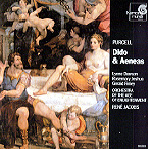Henry Purcell’s Dido & Aeneas has found favor on recordings: it easily fits on one disc, the score is full of wonderful music, even the smaller parts offer enticements sufficient to attract first rate soloists, the drama is to the point and easy to follow, and it has one of the most beautiful arias ever written, Dido’s “When I am laid in earth”. Of the 10 other recorded versions I listened to for comparison, this one fares quite well–in fact, all things considered, it ranks among the two or three best available. Of course, especially when it comes to singing, there are all kinds of tastes that determine a particular favorite, and when a character is involved, such as Dido, interpretation can matter more to some, vocal quality and technique more to others. The same goes for the conductor’s approach to style and whether such things as period practice and details of sound quality are critical.
My preference for a strong yet sympathetically portrayed Dido, a dynamic yet sensitive Belinda, a full-bodied period-instrument orchestra, and an articulate, intuitive, sensitive partnership between singers and continuo–all managed with judiciously paced direction that lets the singers sing and never becomes ponderous–is almost perfectly realized in René Jacobs’ new reading with Lynne Dawson and the Orchestra of the Age of Enlightenment. Dawson’s soprano has an endearing plaintive quality, especially in her fateful Act 3 music, and her Belinda, Rosemary Joshua, is a solid and supportive companion. This orchestra shows not only the kind of crispness and clarity of line and attack we expect from the better period instrument orchestras, but also a full, multi-colored sound that adds even more than usual luster to the score.
However, I said this version almost perfectly realizes my ideal. Unfortunately, the grindingly slow tempo of Dido’s famous aria threatens to derail the critical synergy between vocal line and bass. There’s also a slightly odd instance in the preceding recitative on the word “shades”, where some performers choose a minor chord, others a major. Here, Dawson and her continuo partners seem as if they couldn’t decide and the resulting “harmony” just sounds “off”. Regardless, on the strength of its uniformly excellent singers, complementary orchestral work, and vivid sound, the overall performance makes a satisfying, tightly knit musical drama.
As for this disc’s rivals, Guillemette Laurens, on William Christie’s first recording of the work in 1985 (Harmonia Mundi), has a beautifully warm, rich-colored voice, lovely lower register notes, and nice ornamentation–and also a very slow final aria. Lorraine Hunt is another first rate Dido (her final aria is very sensibly paced), with outstanding support from the Choir of Clare College, the Philharmonia Baroque Orchestra, and conductor Nicolas McGegan (also Harmonia Mundi). Véronique Gens’ gorgeous, ringing voice (if somewhat weak on the lowest notes) is a standout on Christie’s later reading (Erato), and interpretively her rendition is among the more memorable. Perhaps best of all are Catherine Bott, the Academy of Ancient Music, and Christopher Hogwood in a 1992 performance that has a pre-straight-toned Emma Kirkby as Belinda (L’Oiseau Lyre). Bott’s Dido is tender and touching, clear-voiced and characterful, and Hogwood perfectly manages tempos and dramatic pulse. Special mention has to go to Janet Baker, whose heartbreaking rendition of Dido’s “When I am laid in earth” from her classic 1961 Decca recording with Anthony Lewis (and unfazed by Thurston Dart’s rather stilted continuo), is in a class by itself. [3/19/2001]
































